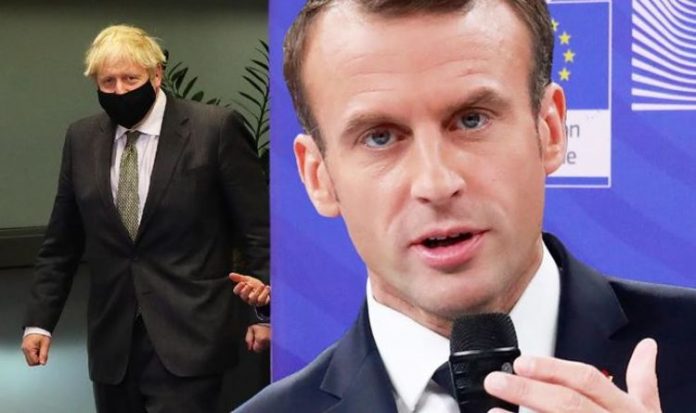Jonathan Eyal, international director of the Royal United Services Institute, argues the two sides are caught in a “game of chicken” with France “pulling strings” behind the European Commission. He says Remainers have encouraged the EU to push Britain harder and claims France thinks the UK will blink first in the negotiations, allowing President Emmanuel Macron to portray himself as a “great defender of French national interests”. Mr Macron, he says, has sought to use the dispute over fishing rights to strengthen support ahead of the next presidential election in coastal communities where he could be vulnerable to Marine Le Pen’s hard right National Front, now renamed National Rally.
Mr Eyal stresses that the risk for France is that if Britain walks out then French fishing could be left in an even worse position than is on the table, with other EU member states blaming France for the collapse of talks.
But he warned the “feeling that is pervasive in Paris [is] that they can still maintain European unanimity on squeezing Britain and that Britain will ultimately be willing to be squeezed”.
Emphasising the importance of the Prime Minister convincing France he is serious about leaving without a deal, he said: “The problem that he had is that the no-deal option has never looked quite credible enough to persuade the French that they should not go any further in this gamble. That’s the snag, that’s the difficulty that the Prime Minister has.”
Mr Eyal said it was “always the case that the French would be pulling strings behind the Commission” and described how France has been able to manipulate the EU.
“All I can say is that for the French the European Union is the gift which keeps on giving,” he said. “It allows them to put pressure on other countries and it allows them to hitch everyone to what very often – not always but very often – are just French national interests dressed up as European Union interests.”
A key mistake by the UK, he argues, was to focus diplomatic attention on trying to influence Germany.
“The curiosity of the British position has been that repeated Prime Ministers – both Theresa May and Boris Johnson – looked to Germany to tone down the French pressure,” he said. “[They] believed the Germans will somehow pull a rabbit out of the hat by putting pressure on the French.
“[The] British hopes were always misplaced because at the end of the day the Germans had other calculations which prevented them from putting too much pressure on the French.”
Describing how Remainers have weakened Britain’s negotiating position, he said: “The problems the British prime ministers had for the last four years is that there is so much noise in London, including from people who believe that the decision to leave the European Union should be reversed, [it] encourages foreign leaders to believe that you can push Britain further.”
Although the European Commission officially negotiates on behalf of all 27 member states, Mr Eyal said that since 2016 there were occasions when it was “very clear that the French were either behind a rejection of an offer of compromise, or actually increased pressure on the British by making the conditions even more difficult”.
He argues it would be impossible for any British prime minister to agree to the “level playing field” sought by the EU and commit the UK to match European regulations.
He said: “I mean, this is really the ultimate blank cheque in every possible way… Brexit has happened.
“We are where we are. I don’t see any British prime minister being able to accept such an outrageous claim that you are basically saying ‘I will abide by whatever you decide for the next 20-30 years’.
Looking towards the endgame, he said: “The question is at what point both sides decide to stop this game of chicken and that in turn depends on the prime minister being able to persuade everyone that at the end of the day he is prepared to bite the bullet and collapse the whole negotiations.”
Mr Eyal claims that “nobody wants a breakdown in the negotiations completely” and says it is possible that Poland and Germany “may ultimately break ranks” with France.
He suggests a compromise could be found on fishing so that cuts in the catches of French fishermen in British waters would only kick-in after the French presidential elections in April 2022.
But he is in no doubt about the high stakes of the talks.
He said: “The problem is that it really is like a game of Russian roulette where everyone is pressing the trigger in the hope that the bullet isn’t there to blow your brains off.”







